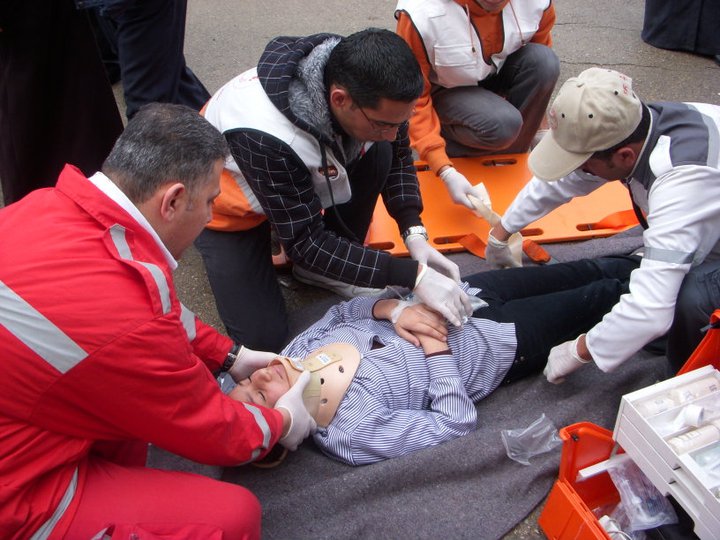
In a highly complex environment like the Occupied Palestinian Territory, people are persevering in the face of an increasingly uncertain socio-economic and political situation which leaves them highly vulnerable to both man made and natural hazards. Palestinians face a host of disaster risks ranging from droughts, flash floods, earthquakes, and the potential outbreak of disease. Not to mention the ever present possibility of political conflict and the reality of the West Bank separation wall that places undue hazards and obstacles in front of the Palestinian people. Because of the unique situation in the West Bank and Gaza Strip there is an urgent need for disaster preparedness and response mechanisms that can operate at a community level.
The Palestine Red Crescent Society’s Community Based Disaster Risk Reduction program, funded by the German Red Cross through the German Federal Ministry for Economic Cooperation and Development (BMZ), in addition to the Norwegian, and Swedish Red Cross, aims to assist in fulfilling that need while providing the tools and support needed to empower communities in Palestine to work to lessen the impact of disaster.
The program targets a total of fifteen communities in the West Bank and Gaza Strip. Ten of those communities are located in the Hebron district with the remaining five located in the Beit Lahia / Jabaliya area of the Gaza Strip. Through the program these fifteen communities are working to establish the organizational mechanisms that will enable them to carry out community based disaster risk reduction activities and also implement small scale mitigation activities that benefit their communities. Vulnerable families in these communities will receive community based first aid training leading to almost 5,300 families having at least one member trained in first aid.
In addition, six targeted schools acquire the basic skills necessary for disaster preparedness and immediate response including first aid stations and evacuation plans.
It is estimated that through the program over 126,000 Palestinians will benefit either directly or indirectly from its services and operations. PRCS has also trained 75 volunteer coaches to assist in the training of 375 new community volunteers that will aid in implementing the work of the program. The target communities included in the program are located in conflict and/or violence prone areas that suffer from high unemployment and poverty rates, severe restrictions regarding access to markets and basic social services, and a high vulnerability to recurrent natural hazards. The program will give special consideration to groups that could be considered most susceptible to the effects of disasters such as women, children, the elderly, disabled individuals, and those suffering from chronic illnesses.
By focusing this program at the community level with heavy involvement from local leaders and volunteers, it is assured that the community itself will take ownership of the programs operations and implementation. This in turn will prove to be a driving force for the overall sustainability of the program. Through this decentralized approach, community members and volunteers are given the tools and knowledge to improve the ability to handle disaster as well as placing significant emphasis on community empowerment.
Through the work of the program in the fifteen communities initially targeted a precedent and model can be established than can then be expanded to other areas of the Occupied Palestinian Territory especially in the Gaza Strip. Over time more members of Palestinian society will be brought into an active role through programs such as this that will collectively strengthen society while reducing the risk of losses due to disasters or hazards. The decentralized and volunteer driven nature of the program promotes the dissemination of knowledge and training that will benefit the community as a whole. A program like Risk Reduction helps to raise community awareness in Palestinian society about issues essential to handling disaster while also promoting independence and knowledge that can be actively used by the community to strengthen Palestinian civil society.